Sparks Lab
|
Another year has come and gone and somehow it's been almost that amount of time since we've posted an update!! It has been a busy year for the Sparks Lab! We continue to expand - welcoming a new researcher (Dave Griffin), a new postdoc (Jingjing Tong) and a new PhD student (Eva Birtell) to the lab over the last year. Looking ahead we have two new PhD students starting in the Fall (Joe Cristiano and Bali Singh) and another new researcher (Emily Kennebeck) starting in August! We are forever grateful to the funding agencies who believe in our work and the collaborators who push the bounds of our research that allow us to reach even great interdisciplinary heights! With the hellos, we also have our farewells! Olivia Hazelwood, who has been with the lab since early 2020 pandemic days, graduate with a BS in Plant Science. She received the departmental faculty award for outstanding undergraduate in plant science and we couldn't be more proud of all she has accomplished! Her first publication was also accepted just a few short weeks ago (Publications)! We can't wait to follow along and see all of the awesome things that Olivia will accomplish in her career! In other news, our summer intern numbers have also expanded dramatically! We have NINE interns joining us this summer. Four from the engineering side: Nicky Reigel, Het Patel, Sebastian Torres and Brandon Maravilla Garcia; five from the biology side: Emilia Pierce, Safiyya Haider, Austin Jensen, Taran Kermani and Mariela Alfaro Garcia. Major shout out to the Sparks Lab members who are spending their time mentoring these interns. We 💚 our interns!!!!
Stay tuned for summer fun pictures coming soon! As always the summer has flown by and we find ourselves asking - where did the time go??? As we round out the end of our summer undergraduate researchers time in lab, we wanted to take some time to recognize them for their awesome achievements! This summer we had two incredible teams of summer undergraduates - the biology team and the engineering team. We are going to miss these awesome people so much!!!! Biology Team!Olivia Hazelwood Olivia is a Plant Science undergraduate here at UD. She has been with the lab since early 2020 and stuck with us through the pandemic. This summer she was awarded a College of Agriculture and Natural Resources Unique Strengths summer fellowship! Her summer research looked at the expression of maize mechanosensitive ion channels (MSL) in aerial and subterranean brace roots. Miranda Farnum Miranda is a Plant Science undergraduate here at UD. This summer she tackled the challenges of working on our maize and sorghum fields. She tirelessly labeled plants, bagged sorghum, weeded our fields, and took meticulous phenotyping notes for postdoc Ashley Hostetler's project! Talia Collier Talia is a Plant Science undergraduate here at UD. In a deviation from our normal work, Talia brought her own project to the lab! Talia has been investigating the metabolite profiles of two different pomegranate cultivars. She received the McNair Summer Scholars award to support this work. Special shoutout to Dr. Nox Makunga (Stellenbosch U) and Dr. John Chater (U Florida) who have made this summer project possible through providing protocols, pomegranates and helpful discussions! Engineering Team!Joe Cristiano, Anthony Jiang, Parker Grobe We had an awesome team of engineers contributing to our work this summer. From left to right: Joe Cristiano is an undergraduate in Electrical and Computer Engineering here at UD; Anthony Jiang is an undergraduate in Mechanical Engineering here at UD; Parker Grobe is a 4+1 who is about to start his MS degree in Mechanical Engineering here at UD. I cannot say enough about how critical this team has been to our summer successes! They tackled a slew of problems - from our version of ROS no longer being supported to designing and building new test frames and so much more.
In the past couple of weeks we wrapped up our Spring 2022 semester! It was a bittersweet end to the semester as we said farewell to grad student Stephen Smith. Stephen has been with us since 2019 and done so much great work and we will surely miss him!
But the sweet side is --- The Sparks Lab is growing by leaps and bounds!!! 1) We welcomed two new PhD students to the lab last week, Irene Ikiriko and K. Thanduanlung! 2) We have a new staff researcher starting in mid-July! 3) We're currently interviewing for a new Postdoc. 4) We have an awesome team of undergraduates in lab this summer: An engineering team of Joe Cristiano, Will Koenig, Anthony Jiang & Parker Grobe; and a biology team of Olivia Hazelwood, Miranda Farnum, & Talia Collier! 5) Thanks to a generous donor, we will also have two high school interns in the field later this summer! Stay tuned for project updates and (hopefully) a "Meet the Sparks Lab" series! Time always gets away from us when we try to make these things happen! We are also expected the return of visiting scholars this summer! We anticipate welcoming Christophe Pradal in early July to finish up our Thomas Jefferson Fund international exchange, and Amanda Rasmussen in late July to kick off our Royal Society international exchange. We are so grateful for these international collaborators and their ability to come visit us! Our corn and sorghum is planted and already out of the ground... let the chaos begin!!! Sparks Lab: Surely we have updated our website in the past few months...
Narrator: They have not. We opened the lab website to find a draft post from last April starting with the above... that we never completed and shared. DOH. So now we've been years since updating! Where has the time gone?!?!?! We wanted to take a moment and reflect on the past year. 2021 was a year of professional and personal challenges for many in the lab, but we made it through! And looking back there were some major milestones that we want to recognize: - Dr. Lindsay Erndwein - the first Sparks Lab PhD student successfully defended her thesis last April! 🥳 Lindsay is now working as a USDA ORISE postdoctoral researcher in New Jersey! - We got not one, not two, but three new grant awards in 2021! For full details, you can check out our Research Grant Funding page. After years of grant rejections, we are delighted to receive this new funding and forever grateful to the reviewers and funding agencies that believe in our work. - Along with this new funding, we've just recently had a slew of papers accepted! Former postdoc Adam Stager had a Methods in Molecular Biology paper accepted, Current postdoc Ashley Hostetler had a Plant, Cell & Environment paper accepted, and Ashley & Lindsay were co-first author on a manuscript that was conditionally accepted at Annals of Botany! Check out our Publications page for full details. So much to celebrate!!! - We also have an amazing team of undergraduate and high school students that joined us for internships this past summer and have continued to do research in our lab this school year! We're grateful for their hard work and enthusiasm for science! As we look forward to 2022, we are optimistic for the future of the Sparks lab. We have new people joining us - stay tuned for intro & bios later this semester, have new funding to be announced, and a few more papers in the pipeline! We wish all of our friends, collaborators, and colleagues a joyful 2022 and hope to see you all in person one day soon. As the Fall 2020 semester draws to a close, we thought it prudent to give you all an update on how we are faring! While the shift to remote work and remote learning has been difficult for us all, the Sparks lab has shown amazing resilience and flexibility through these transitions. We are continually amazed by and grateful for the wonderful group of scientists that are in the lab. 💚 Where to begin... Since the last update, we have had two more publications accepted!!! 🥳. The first came out in Plant Direct this November: "Maize Brace Roots Provide Stalk Anchorage", and directly established the link between brace roots and their ability to stabilize maize stalks. This paper was featured as the Article of the Week in Plant Direct, and is the outcome of a great collaboration with Drs. Brian Dilkes & Raj Khangura at Purdue University. A second manuscript was just accepted at Current Opinion in Plant Biology: "Bracing for sustainable agriculture: the development and function of brace roots in members of the Poaceae". The accepted version of the manuscript is available through arXiv prior to publication. This review was spearheaded by Sparks Lab postdoc Ashley Henderson, again in collaboration with Brian and Raj. Needless to say, this has been a very fruitful collaboration between our labs with more publications to follow! We are hoping to continue this positive publication trend with a few more papers targeted for submission in late 2020 and early 2021!! It's also that time of year for impending departures and the welcoming of new faces... The first Sparks Lab postdoc, Adam Stager, left the lab in September to focus on his start-up endeavors full time. We are so grateful that Adam spent a year with us, and we have so many new tools as an outcome of his time in lab. We wish him the best of luck with his entrepreneurial endeavors!!! This Fall is the graduation of our first thesis-based MS student, Sarah Blizard. Sarah will be departing the lab at the end of the year, and we are sad to see her go. Sarah has been an integral part of the Sparks lab foundation and we are so proud of all she has accomplished! In addition, PhD candidate Lindsay Erndwein just received permission to graduate, so she will be frantically writing over the next several months with a targeted graduation of Spring 2021! As our students are graduating and moving on to new opportunities, we are also happy to welcome new people into the lab. Tecle Weldekidan joins the Sparks lab as a research scientist starting December 2020! Tecle has been working at the University of Delaware for over 30-years and was integral to launching the Sparks lab field research program through research collaboration. Tecle brings a wealth of experience in corn breeding to our lab and we are delighted for him to join us. As we wrap up 2020 - which has been a tumultuous year filled with ups and downs - we reflect on the joy that our colleagues and collaborators bring to us. The wonderful community of plant biologists and engineers that we have the opportunity to work with is truly our reason to smile. We wish you all the best as we start the holiday season. Stay safe and stay well. 💚🌽💚
Our latest review on Field-based mechanical phenotyping to assess lodging resistance (Erndwein et al., 2020) is now available!
https://doi.org/10.1002/aps3.11382 We are delighted to announce that the Sparks lab was awarded a seed grant from the Delaware Space Grant for the continued development of our 2D clinostat growth system! THANK YOU to the DE Space Grant! We appreciate all of your support, and cannot wait to add an imaging component to our 2D clinostat.
The Sparks lab turned THREE this summer, and time has flown by. While we were not able to celebrate in person due to the covid-19 pandemic, we still virtually celebrate this milestone and cannot wait to be back together for a belated celebration. The lab has been shuttered since early March, and we are slowly returning to research. The first step has been - moving! We are still in the process, but the bulk of our lab moved to the STAR campus this past week. We are still waiting for chemicals and cold storage to move, but hopefully we can resume some research in mid-July (as long as we can ensure that we do this safely). Other news includes the migration of our lab website to braceroots.com! It has been a labor of love to migrate our website and it is finally ready for release. We hope you visit our site often, as we promise to continue updating content. A fantastic undergraduate, Nick Insley, was also awarded a Delaware Space Grant NASA summer internship! While not exactly the project we had originally planned, we were able to pivot Nick to a virtual summer project! Sarah Blizard successfully defended her MS thesis in June, but will stay on for another semester to finish experiments that were cancelled due to the pandemic. Huge congratulations to both Nick and Sarah!!! Last, but certainly not least, we have been reflecting on diversity and inclusion. This includes additional discussions about how we can ensure the lab is an inclusive place, and educating ourselves about systemic racism and how the academy contributes to these problems. We believe that Black Lives Matter No Human is Illegal Love is Love Science is Real Women's Rights are Human Rights and pledge to become better allies by uplifting and amplifying under-represented voices, continuing our education on racism, diversity and inclusion, and speaking out when we see or experience injustices.
This post is part of a migration of posts from our previous website. Originally posted on May 4, 2020
Since our last post, there have been significant changes to the world. So first, we hope that everyone is staying safe and well! We are all hanging in there, and Erin couldn’t be more proud of how well the lab has adapted to the work-from-home transition. We have a weekly coffee hour just to check in and while we miss seeing everyone in person, we are glad to be doing our little part to slow the spread. The work from home has allows for some exciting new opportunities and our awesome team members continue to shine!
In more good news, we are welcoming Dr. Ashley Henderson to the lab as a postdoc starting June 1st. Ashley just finished her PhD at West Virginia University with Dr. Jennifer Hawkins. Ashley brings a wealth of experience in sorghum, genetics and abiotic stress tolerance to the lab, and we are so excited for her to join the team. She will be working to expand our understanding of brace roots from maize to sorghum! We look forward to seeing you all in the near future! This post is part of a migration of posts from our previous website. Originally posted on March 4, 2020 Happy Spring Semester! The Sparks lab has had a busy and productive start to 2020! If you wonder what we’ve been up to, here is a preview… First, for some personnel changes. At the end of January we were sad to say farewell to lab technician Noah Ouslander. Noah was the first undergraduate in the Sparks lab and stayed on for ~2 years as a technician. He was instrumental in getting the lab running and we are sad to see him go. BUT Noah is now pursuing his passions in cannabis cultivation and we wish him the best in the next stage of his career! Some major milestones were accomplished by the lab members in the past few months. MS student Stephen Smith received a College of Agriculture and Natural Resources Unique Strengths Fellowship to transition into the PhD program this coming Fall! Stephen has really hit the ground running with his projects and we are excited he will stay for a PhD. MS student Sarah Blizard wrote a review on Maize Nodal Roots that was accepted at Annual Plant Reviews Online! The review is being copy edited now and should be available in May. Postdoc Dr. Adam Stager and Dr. Sparks made a second visit to CIRAD in Montpellier France as part of the lab’s Thomas Jefferson Fund project. They spent the first week at the iCropM conference, followed by a side event organized by Dr. Sparks and Dr. Christophe Pradal on Phenotyping and modeling of plant anchorage and physiology. This 2-day workshop highlighted the challenges in the field and featured excellent talks from a wide variety of scientific disciplines. The second week was spent updating and refining a plant mechanical model that will be used to identify brace root ideotypes for anchorage. In the last phase of this project, Dr. Pradal and Dr. Christian Fournier will visit the University of Delaware in July! For the third year in a row, Dr. Sparks and PhD student Lindsay Erndwein volunteered at the Sussex County STEM Alliance Engineering Your Tomorrow Event. This event is aimed at 6th-8th grade girls and to spark their interest in careers in STEM. This year Dr. Sparks designed an activity of “Exploding Pollen”! She had recently seen a talk from WashU graduate student Kari Miller in Dr. Liz Haswell’s lab at WashU. Kari’s work on the MSL8 mechanosensitive ion channel showed that Arabidopsis pollen mutant for mls8 will take on too much water and explode! Kari and Dr. Haswell were amazing to provide seeds that allowed this activity to happen. We are also grateful to Echo Microscopes for bringing their Revolve for the girls to view the pollen. Looking ahead, Dr. Sparks will head off to the Maize Genetics Conferences in Kona, HI next week. This is hands-down the best conference for idea generation, discussion, and gaining new resources. We are so grateful that the Maize community has embraced our research and is so open with their resources and expertise! Immediately upon return, the lab will be moving across campus to a new building! We are very excited to be moving closer to the rest of the agriculture research on campus, and into this new space. Pictures to come! We also promise to provide project updates soon! 🙂 |
|
Sparks Lab
University of Delaware |
Proudly powered by Weebly
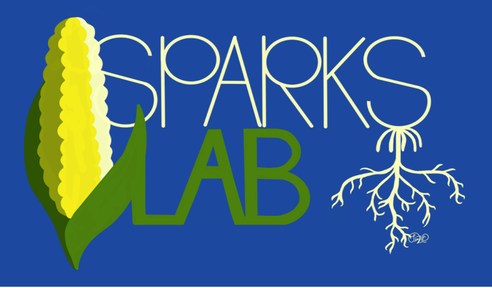
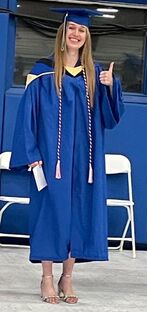
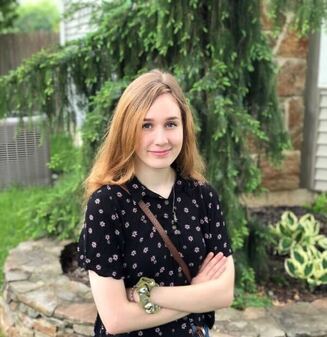
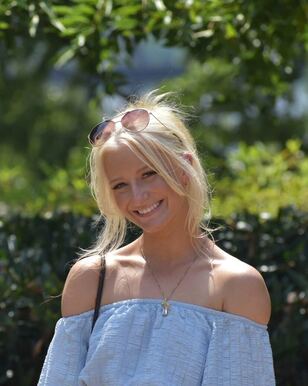
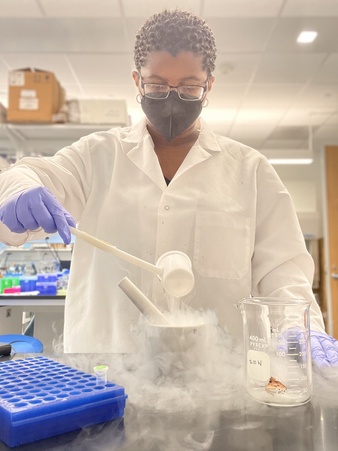
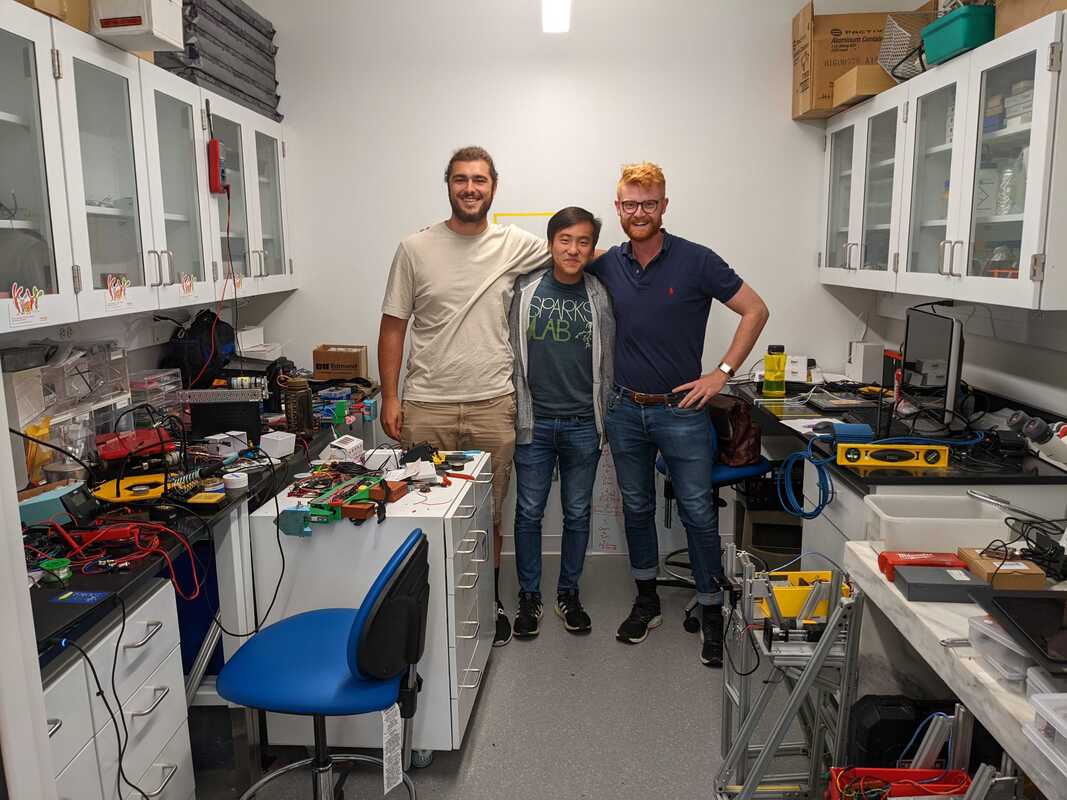
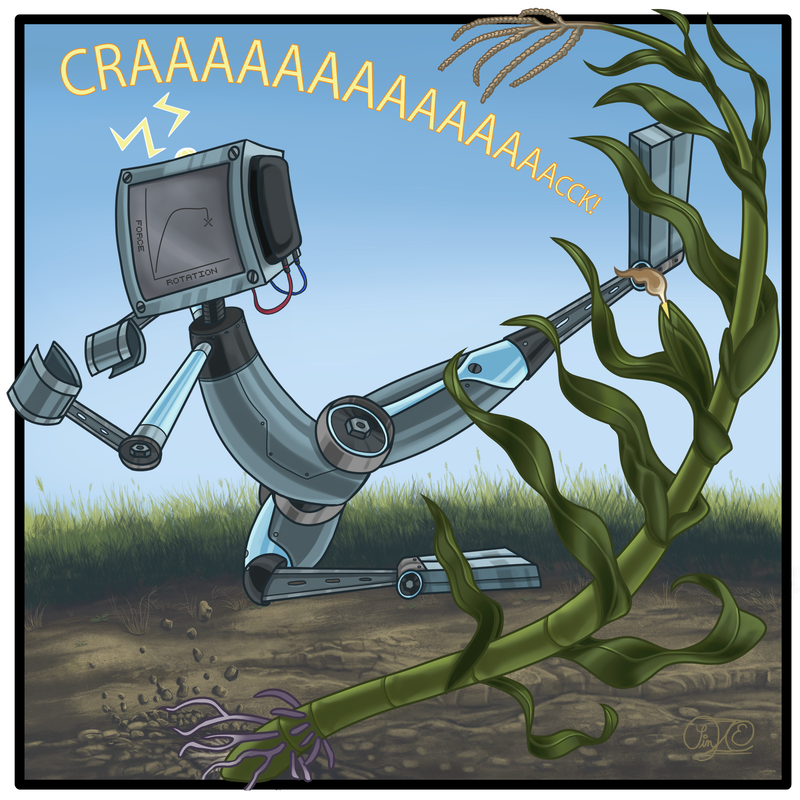
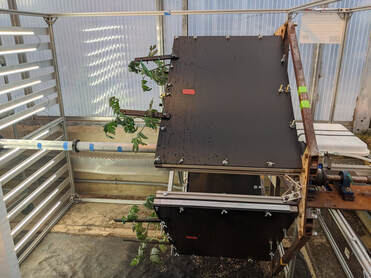
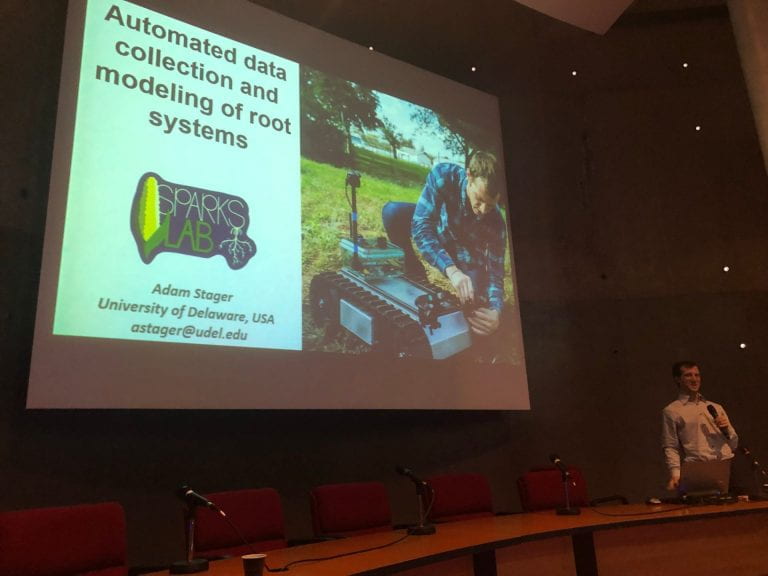
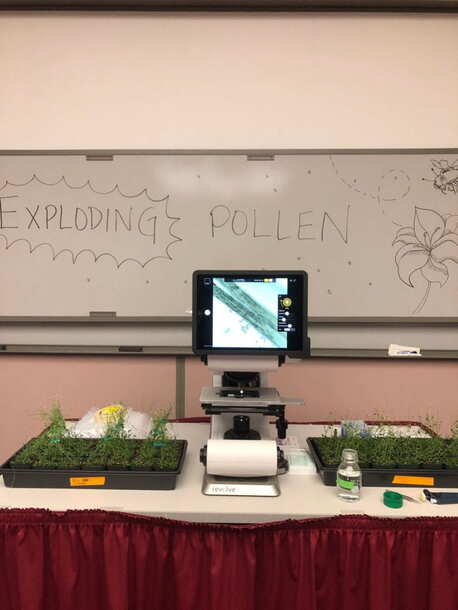
 RSS Feed
RSS Feed